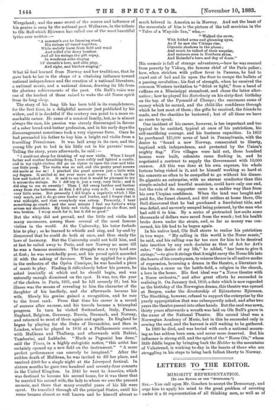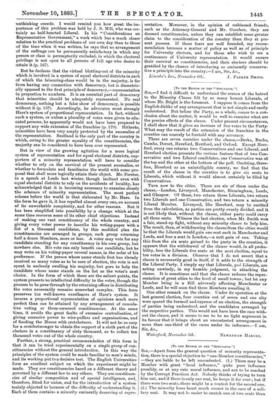LETTERS TO THE EDITOR.
MINORITY REPRESENTATION. Cro THE EDITOR OF THE "SPECTATOR."] Stn,—You call upon Mr. Goschen to accept the Democracy, and urge him to apply his mind to the great problem of securing under it a fit representation of all thinking men, as well as of
unthinking crowds. I would remind you how great the im- portance of this problem was held by J. S. Mill, who was cer- tainly no half-hearted Liberal. In his " Considerations on Representative Government," a work which has a much closer relation to the practical problems of our own day than to those of the time when it was written, he says that no arrangement of the suffrage can be permanently satisfactory in which any person or class is peremptorily excluded, in which the electoral privilege is not open to all persons of full age who desire to attain it (p. 167).
But he declares that the virtual blotting-out of the minority which is involved in a system of equal electoral districts in each 'of which the labouring-class would be in the majority, is far from having any connection with democracy, but is diametric- ally opposed to the first principle of democracy,—representation in proportion to numbers. It is an essential part of democracy that minorities should be adequately represented. No real democracy, nothing bat a false show of democracy, is possible without it (p. 137). Accordingly, he advocates most strongly Hare's system of proportional representation. In fact, without such a system, or unless a plurality of votes were given to edu- cated persons, he apparently would not have been prepared to support any wide extension of the franchise (p. 179). Hitherto, minorities have been very amply protected by the anomalies of the representation. Scotland is the only part of the country in which, owing to the greater equality of the constituencies, the majority can be considered to have been over represented.
But in view of the growing agitation for a more logical system of representation and for equal electoral districts, sup- porters of a minority representation will have to consider whether to rely on the survival of the present anomalies, or whether to formulate and familiarise the world with some pro- posal that shall more logically attain their object. Mr. Forster, in a speech at Leeds last winter, though inclined even with equal electoral districts to rely on the accidents of locality, has acknowledged that it is becoming necessary to examine closely the schemes of minority representation. The most perfect scheme before the world is that elaborated by Mr. Hare. In the form he gave it, it has repelled almost every one, on account of its unworkable complexity, and for other reasons. But it has been simplified into possibility by a change which at the
same time removes some of its other chief objections. Instead of making one vast constituency of the whole country, and giving every voter power to inscribe his voting-paper with a list of a thousand candidates, by this modified plan the constituencies are arranged in groups, each group returning half a dozen Members, more or less. A voter may vote for any candidate standing for any constituency in his own group, but .nowhere else. His vote can only benefit one candidate, but he may write on his voting-paper several names, in the order of his preference. If the person whose name stands first has already received so many votes as to be sure of election, the vote is not spent in uselessly swelling his majority, but goes to help the candidate whose name stands on the list as the voter's next choice. In the form of which these are the salient points, the system presents no intellectual difficulty to the voter, though the process to be gone through by the returning officer in distributing the votes necessarily remains somewhat complex. This form preserves the well-known excellences of Hare's system. It insures a proportional representation of opinions much more perfect than can be attained by any arrangement of cumula- tive voting or three-cornered constituencies. At the same time, it avoids the great faults of excessive centralisation, of giving excessive power to wire-pullers and organisations, and of flooding the House with crotcheteers. It will not be so easy Tor a crotchetmonger to obtain the support of a sixth part of the electors in a constituency of sixty thousand, as to collect ten thousand votes oat of the whole country.
Farther, a strong, practical recommendation of this form is That it can be tried experimentally on a single group of con- stituencies without the general introduction. In this way the principles of the system could be made familiar to men's minds, and its working put to a decisive test. The English Universities form an excellent subject on which the experiment might be made. They are constituencies based on a different theory and governed by a different law to any others. They are constituen- cies of similar composition and of special intelligence, and, therefore, fitted for union, and for the introduction of a system Mainly objected to because of the difficulty of understanding it. Each of them contains a minority eminently deserving of repre-
sentation. Moreover, in the opinion of unbiassed friends, such as the Attorney-General and Mr. Goschen, they are doomed constituencies, unless they can establish some greater claim to the consideration of the country than they at pre- sent possess. If these fears are well founded, my recom- mendation becomes a matter of policy as well as of principle for University electors, and for those who wish to see a continuance of University representation. It would ensure their survival as constituencies, and their electors should be gratified by the chance of introducing so eminently conserva- tive a principle into the country .—I am, Sir, &c.,
Lincoln's Inn, November 6th. J. PARKER SMITH.



































 Previous page
Previous page